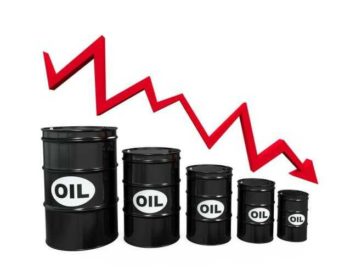
Analysts have said that the current instability in the price of crude oil could make it difficult for Nigeria to come out of recession especially if the drop in price persist. Although the price of rose to about $57 per barrel yesterday, the price of oil has been hovering for some time between $53 and $55 per barrel far below Nigeria government’s expectation of $60.
Also despite the 2,2 million barrels projected production quota, by the government, the country was yet to meet this putting unusual pressure on the economy.
A policy analysts and commentator on petroleum affairs, Prof Chijioke Nwaozuzu, said that oil revenue has been and still is the mainstay of the national economy and is likely to remain so for a long time to come, as it currently provides the bulk of government revenue and most of the foreign exchange earnings.
“At present, crude oil exports account for about 90 percent of foreign exchange earnings and 80 percent of government revenue; thus making the country’s economy heavily reliant on the petroleum sector,” he declared.
He noted that the current crash in the price of crude oil in the international market portends negative implications for government revenue.
“Oil accounts for about 15% of Nigeria’s GDP but it makes up about 80% of government revenue. Thus, the declining oil price has adversely affected governments’ revenue increasing the requirement for borrowing and debt service, thereby impacting the funds available for capital expenditure.”
According to him, it is disheartening to note that despite the positive windfall gains arising from the benchmark oil price of $79, $77.5 and $65 in 2013, 2014 and 2015 respectively, the country’s external reserves declined precipitously from $53.6 Billion in 2008 $30.9 billion as at March 2015.
“This declining trend in external reserves reflects the current concern of the CBN to continuously defend the Naira in the face of dwindling foreign reserves,” he noted.
Also, Director, Centre for Petroleum, Energy Law and Economics, Professor Adeola Adenikinju said that current instability in the price oil will badly affect government revenue and the move to rebound the economy.
He said that because of the way the country squandered its surplus in the past, current trend in the rising and falling of oil prices will continue to take heavy toll on government revenue.
As a reflection of the falling oil prices, the oil majors, including ExxonMobil, Statoil, Royal Dutch Shell and Total are all suffering from a falling reserve base as they fail to replace the reserves that are being produced.
Exxon, for example, saw its reserves fall to an equivalent of just 13 years’ worth of oil, given its current rate of production. That is the lowest lifespan since 1997. Shell has the lowest reserve life since 2008, even after incorporating the large oil and gas reserves from its purchase of BG Group.